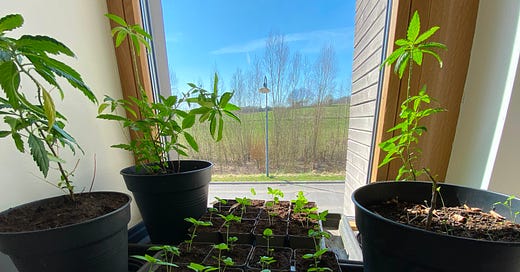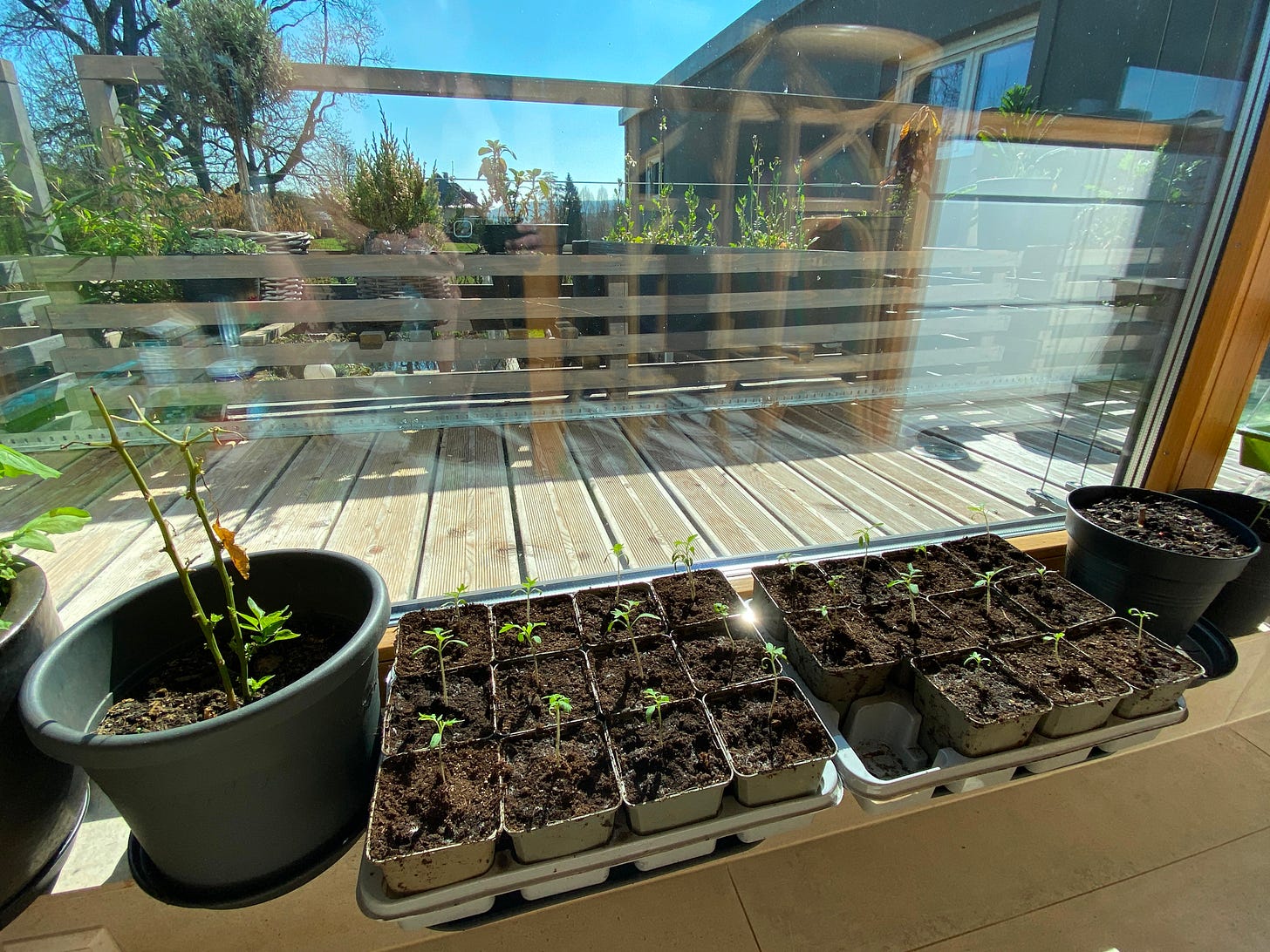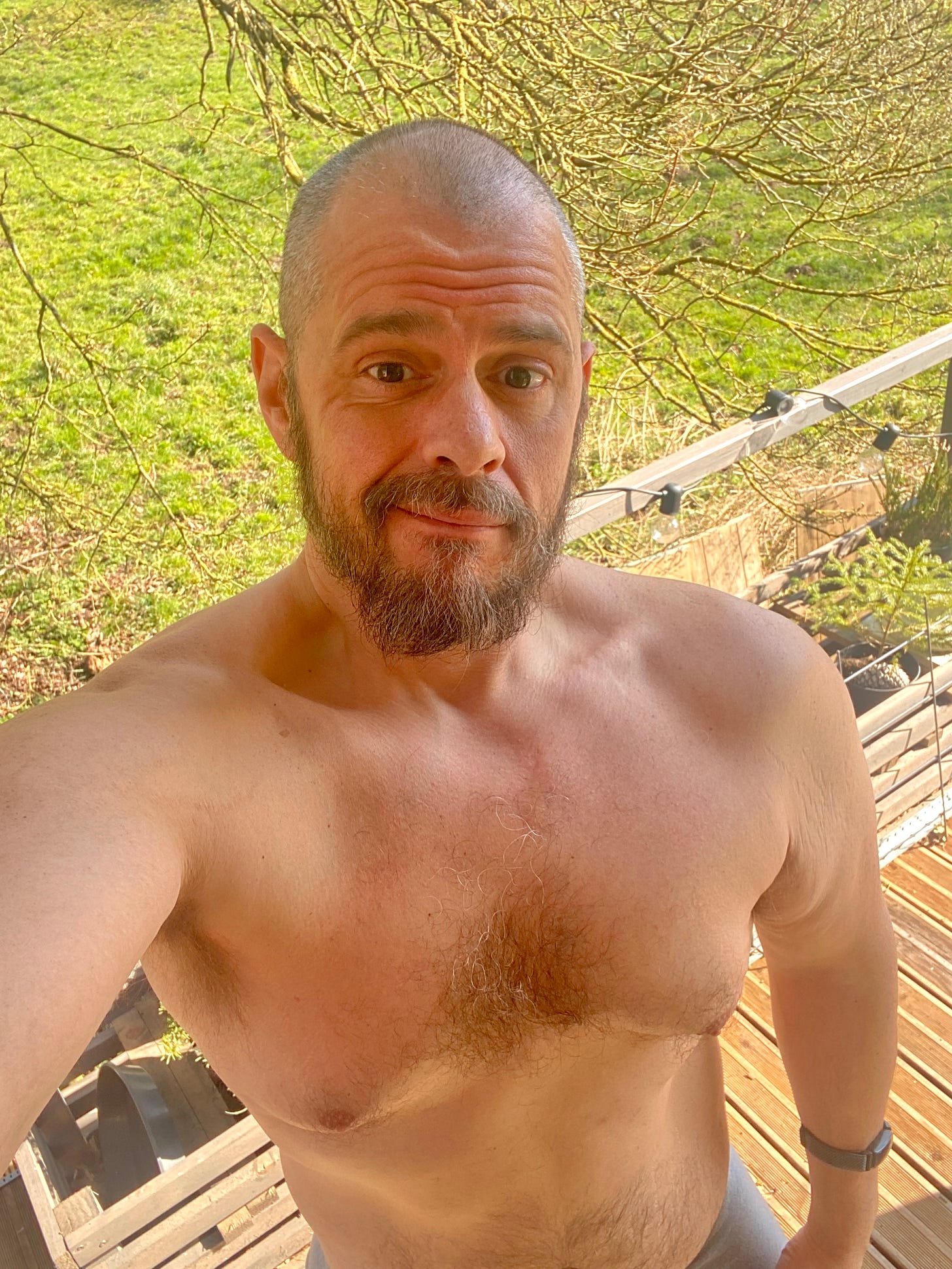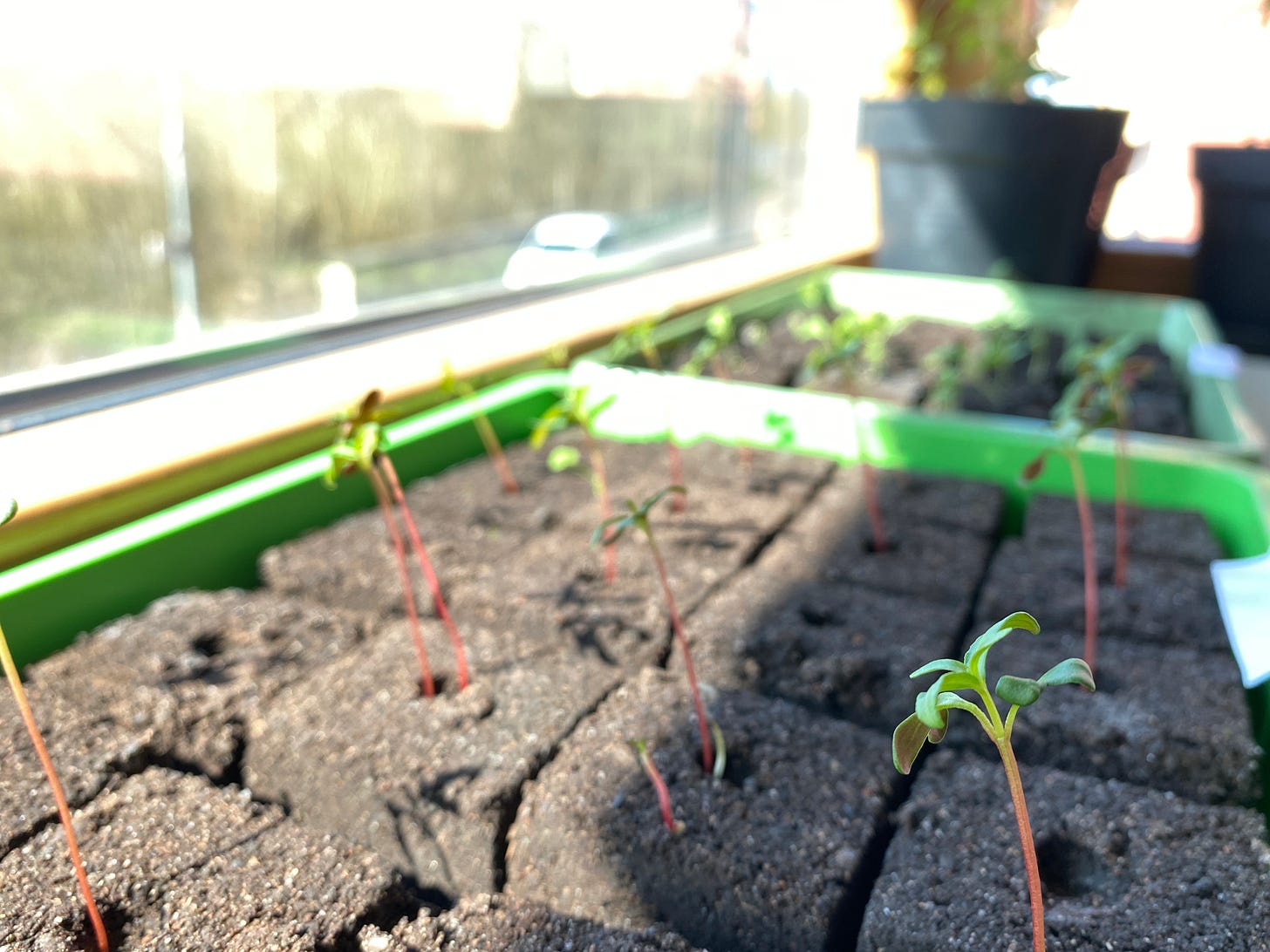We imagine the world as unsafe, and then we dream the world as unsafe, and then feel in our bodies that the world is unsafe. And this is an inverted order of things, the opposite of how our bodies come to knowledge.
At the beginning of this month I started my garden for the year. As a birthday gift to me, but certainly for both of us, my husband paid the bill for a very large seed and plant order from a German rare-plant nursery. Though the plants won’t arrive until late April, the seeds came quickly, and I began working with them immediately.
Inside my house, lining every window with southern, south-eastern, and south-western exposure are the seedlings which have already come up. I’ve twenty-four Basils and the same of Tomatoes already put in their second pots, along with five Watermelon and three Cannabis. All of my overwintered Damiana thrived happily and have themselves been repotted, and two of three overwintered Piment d’Espellette have come back nicely. Sadly, I lost most of my Moringa trees to beetle grubs, but one still holds on and might yet survive.
Almost ready to pot up are two dozen Eucalyptus, and the same of Mauritanian Mallow, Red Epazote, and Ashwagandha, while my Heliotrope, Gotu Kola, early Red Pepper and mid-season Orange Pepper will need more time. And this weekend, I’ll seed even more.
My work’s helped greatly by two new tools this year. The first is a clod-press (or soil blocker), a simple device popular in European greenhouses. It compresses the soil you’re using for starts into compact blocks that can be used instead of paper or plastic pots, and it’s really rather fun to use. The second, a gift from my sister to my husband for his help designing her house, is a 6.25 m2 glass greenhouse which we’ll assemble once its foundation in my garden plot is settled.
I’ve already, of course, overfilled that greenhouse in my mind. Many of the rare and heat-loving plants we ordered will be the first into it, especially the Vetiver grasses, a Sassafras, Tea Tree and a Lemon tree, a Patchouli shrub, a Jiaogulan, and a Japanese Honeysuckle. Some will stay in there all year, while others will get permanent places once stronger. Those will be replaced in the greenhouse with the aforementioned Basque hot peppers and especially some Habanero, Cucumber, and a portion of the Tomatoes and Basils.
The rest I’ll plant this year? It’s really quite a list, and I’ll not try to detail them all: Virginia Black Root, Artichoke, Arugula, six varieties of Kale and eight of Lettuce, Red Sunflowers, Orange Amaranth, more Mallows, Foxgloves, Stockroses, Moonflowers all added to my yearly plantings of Cilantro, Crimson Amaranth, Spinach, Carrots, Tobacco, and Cathedral Bells and my established perennials (Thyme, Rosemary, Chives, Laurel, and Strawberry).
Also, we went a bit wild with berries and fruit trees. We’ve already had Red Currants, Apple, and Pear, but last year’s just-established Plums and Cherries should be ready to fruit, joined by Black Currant, Blueberries, and Raspberries.
If you don’t garden, perhaps this all sounds a bit insane. And even if you do garden, you might imagine we’ve much more space than we really have. On that latter point, trust me: it’s an issue. Our lawn is finally almost gone, except for a pleasant little strip which we’ve saved for my mother-in-law. Our backyard now looks much like a food forest, and our back patio will look like a jungle by mid-summer.
But for those who don’t garden and might be wondering why I put so much work into this, I’ll tell you it’s the same reason I put so much work in at the gym. In fact, there’s no difference in my mind between my three lifting sessions and two cardio sessions a week and this constant march of seeding and re-potting and planting.
It’s all the body, and a dance of bodies.
This is no metaphor — I mean this all literally. Plants are bodies like we are bodies, and tending the bodies that are plants is the same work as tending the bodies that are us.
The more I do each of these things, the more they feel the same. No, of course the effort is different, but lifting and pushing really heavy barbells and carefully dropping tiny seeds into narrow holes in soil clods are both ritual acts to the same pantheon of gods and devotions in the same cosmological order.
And I mention all this because this is all that really matters, especially now. Over the past few weeks, I spent some time trying to understand the panic and terror washing through the collective false consciousness of the internet. Some people I know and like seem really to have lost their minds, by which I really mean they’ve lost their bodies.
My friend
, who writes short yet profound observations woven from his personal magical work and his professional therapy practice, recently noted the matter of pollution in regards to the imaginal world:There’s a kind of psychic pollution in the air. Forces leak in with messages that would inspire powerlessness, rage, or blind superiority and indifference to human suffering. I notice when scrolling through Instagram that some of these previews to reels are just little flickers, barely a couple seconds, but enough to show some facial expression or piece of text that raises alarm, disgust, or titillation. One is tempted to click through just to mock and belittle whomever it is in the reel. Even that is a pollution to the imaginal world. You see something without context in a way that seems to justify your most uncharitable assumptions about others, and then see scores of comments of shit no one would say to another person’s face, and even if that’s all the media you’ve consumed for a day, the world is a bit darker.
There’s a long essay I hope to write one day soon about this matter, but just that short line about “pollution to the imaginal world” is enough to understand what is happening.
People — many of them friends I’ve known to be otherwise reasonable — have become so polluted by feeding on algorithmic despair that they’ve lost any sense of what is real.
In such a state, you lose your mind, which is to really say you lose your body. You feed on and then feed into the despair, spread it, becoming vectors for imaginal viruses which plague your unconscious bodily dreaming.
We imagine the world as unsafe, and then we dream the world as unsafe, and then feel in our bodies that the world is unsafe. And this is an inverted order of things, the opposite of how our bodies come to knowledge.
In gardening and in gym work, we feel bodies and trust them. We understand them as safe, and because we are those bodies, we dream their solidity and surety into the world. And from those dreams, we imagine more ways to be more bodies, to dance those dreams into the world, seeding more surety and solidity into our interactions with other humans.
Put another way, the algorithmic pollutes the world through the body. The only real defense against such pollution is to expand the body, its capacities, its dreamings, and especially its strength and its health, so that such pollution can act only at most as a cold we barely notice passing through us.
And building the body is simple. It’s gardening, or lifting weights, but also other things. An evening with friends without phones anywhere in sight. An afternoon in the spring sunlight as the chill morning air warms away. Wrestling with a dog or a friend or a mate, a meal you cook with attention, a warm bath just because you can. Every moment away from a screen is a chance to be body, to heal the wounds and lesions of the imaginal terror, to fight the infections ravaging our collective dreamings.
The garden I am growing is a work of the body and a dance of bodies. And it is the same with my gym work, and with any other ritual of unpolluted life. It is food, and it is medicine, but it is most of all beauty, a bulwark against fear, and a fertile earth for dreaming a world no longer polluted by imaginal terror.









This reminds me of a thought that’s being floating around in my head. I was reading some yoga book and the author mentioned yoga as linking mind and body. And I really liked that, and took it a step further to thinking of how the breath links mind and body. Both mind and body need oxygen to function, and the breath is a common ground between the abstractions of the brain and the realities of the body. And since breath is also what we use to speak, it is also a link between the self and others.
As a American though I tend conservative and was happy to see Trump elected I do agree with Mercutio in Romeo and Juliet who said “a plague on both their houses” when speaking of the rival clans, the Montagues and Capulets. My own preferred society, not to happen soon in this present system, would be Chestertonian distributism https://en.wikipedia.org/wiki/Distributism combined with a conscious living in balance with the earth. Not on the Trumpian agenda or his opponents.
From the model of my parents I learned to live responsibly in the here and now where I actually have some control and volition and not worry about big picture things I have no control over beyond periodically making marks on paper that I mail in (voting) and deal with stuff as it comes into my personal sphere. I also realize no matter what source I go to the source will have partial, incomplete information so I hold my opinions lightly and don’t get all riled up and aim to be friendly with everyone.
It seems to me that sometime in the next 20 years or so. we will be hitting resource limits and the dream of endless tech progress and economic growth and settling Mars will hit a wall and painful adjustments will begin.